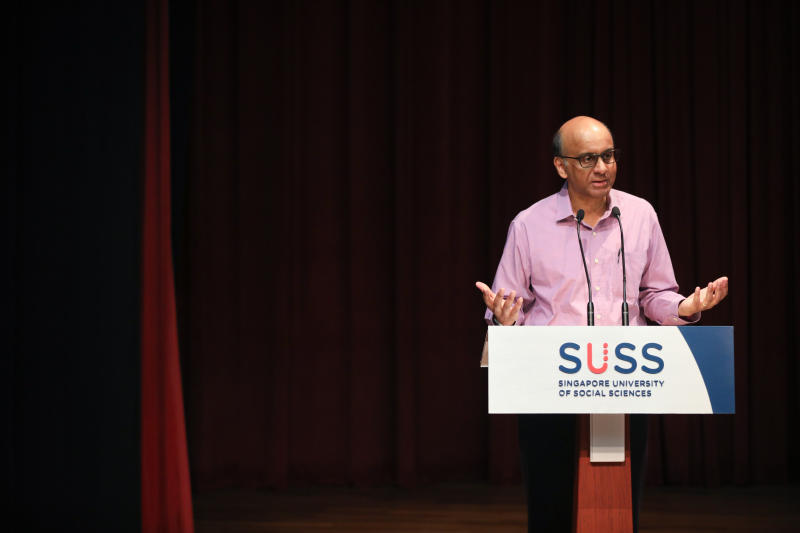Singapore can be world leader in cultivating lifelong learning, says Tharman Shanmugaratnam
Sign up now: Get ST's newsletters delivered to your inbox

Singapore is still at an early stage of the SkillsFuture journey, stressed Deputy Prime Minister Tharman Shanmugaratnam, and like other countries, has a lot to learn from each other.
ST PHOTO: ONG WEE JIN
Adrian Lim
Follow topic:
SINGAPORE - Many countries are on a journey to help their citizens master skills throughout their careers and develop a culture of lifelong learning, but none have emerged as the leader in this field.
Singapore can be at the forefront in this endeavour, said Deputy Prime Minister Tharman Shanmugaratnam on Thursday (April 25), with its SkillsFuture national movement to change how people view skills, jobs and learning.
And the recent teaming up of the Institute for Adult Learning (IAL) and Singapore University of Social Sciences (SUSS) will make a "powerful vanguard" in the Republic's journey, Mr Tharman said at the university's 14th anniversary celebration, held at its campus in Clementi Road.
Singapore is still at an early stage of the SkillsFuture journey, he stressed, and like other countries, has a lot to learn from each other. But he expressed confidence that the merger will provide a boost.
Since April 1, the IAL has been restructured as an autonomous institute in SUSS, and both will work to advance the field of adult learning, through research and developing new courses for adult educators, among other plans.
In a 14-minute speech discussing the IAL, SUSS and its synergies, Mr Tharman said SkillsFuture is quite simply Singapore's "most important economic and social strategy in the long term".
On the economic front, Singapore is only as competitive as the skills it has, he said, adding that there must be a continuous deepening of skills and picking up of new ones throughout a worker's career.
On the social side, Singapore is trying to create a meritocracy of skills, rather than grades earned early in life, as a new form of social mobility.
Singapore also wants to develop a new social culture, where people get satisfaction in life from learning at every stage regardless of where they start, satisfaction from mastering the skill, and satisfaction from being part of a community of learners, he added.
"Internationally, there is no real leader in this endeavour. Different countries are adopting different approaches, we are learning from each other," said the Deputy Prime Minister, who is also the Coordinating Minister for Economic and Social Policies.
He gave the example of Denmark, which since 2017 has built into the collective agreements between employers and trade unions the obligation for employers to design and invest in training for their workers and give them time off for it.
Canada recently has introduced a training benefit to help workers take time off and help them pay for training. It did so after studying different approaches, including Singapore's SkillsFuture initiative.
Referring to what he said in an interview last year - that Singapore is "no more than one-third" on the way of the SkillsFuture journey - Mr Tharman noted that Education Minister Ong Ye Kung's assessment was that the Republic was more like a quarter into the journey.
He quipped: "But I guess this is the difference between being 3G and 4G (leaders). If you are 3G, you say no more than one-third, if you are 4G , you say more like a quarter, but it is the same thing." Mr Ong was among the 500 people in the audience at SUSS' Performing Arts Theatre.
"It's early days, and it's a very exciting journey that we have embarked on and SUSS together with IAL now will be at the vanguard of this journey," he said.
Turning to the strengths of SUSS, Mr Tharman noted it offers flexibility in course structures, and in creating clusters of modules that meet the needs of industry, as well as having lecturers from the industry come in to teach courses.
It is also on the "cutting edge" by recognising learning at the workplace and accrediting it, he added. SUSS, for example, recognises the work and teaching experience of selected pre-school teachers from NTUC First Campus, and exempts them from certain modules, subject to its admissions interview.
IAL, established in 2008, has a core mission of developing expertise among adult educators, and bases its practices on research, Mr Tharman noted.
In their collaboration, IAL can further its research into how adults learn, by drawing on new data regarding SUSS students' learning experiences and also design new courses for adult educators.
Third, the two organisations can bring together their enterprise networks and curate courses that are relevant to the needs of organisations, "and not just learning opportunities that are for the sake of a national programme", he said.
"We are creating a very powerful vanguard in our SkillsFuture journey that will bring a lot of understanding as to how adult learners learn best, (and) introduce enough flexibility in the process because we all learn differently, both as kids and as adults," Mr Tharman said.
This vanguard will work with the rest of the eco-system - the other universities, polytechnics, the Institutes of Technical Education, private training providers, unions and enterprises to take things to the next level, he added.
"Singapore must be very good at this, and we can be in the lead internationally," he said.

